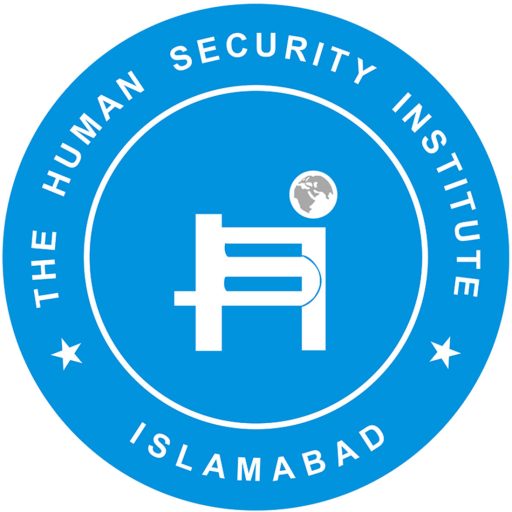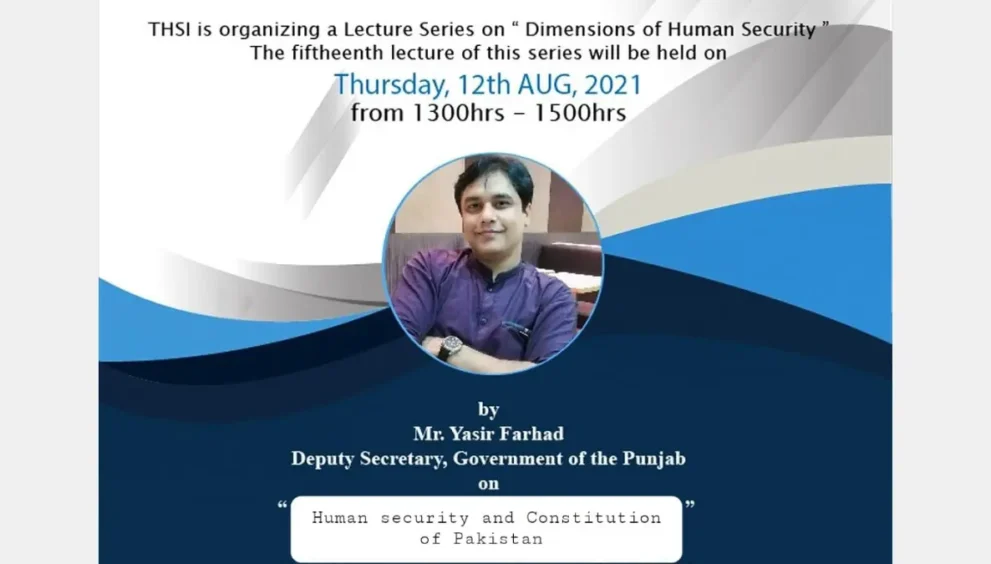The Human Security Institute
Minutes of the 15th lecture of Lecture Series on “Exploring the Dimensions of Human Security”.
Topic of the Lecture: Human Security and Constitution of Pakistan 1973
Guest Speaker: Rai Yasir Farhad
Date: August 12, 2021
Time: 01:00 pm
Origin of Constitutional concept of Human Security:
The fundamental concepts of human security are derived from Magna Carta is a royal charter of rights agreed to by King John of England at Runnymede, near Windsor, on 15 June 1215. The absolute monarch was made to concede that subjects possessed certain rights which could not be violated even by the sovereign. The origin of fundamental rights in modern Constitutions can be traced back to 17th and 18th century philosophers; John Locke and Rousseau. Initial rights were life, liberty and property, inviolability of human person was added later. American constitution and courts played a vital role in development of modern concepts of rights.
What is a Fundamental Right?
- Right is an interest recognized and protected at law, it can be enforced or created either by a constitutional provision or by an ordinary enactment. When a right is safeguarded by constitutional guarantee it is called fundamental right.
- ‘Fundamental rights in the essence are restraints on the arbitrary exercise of power by the state in relation to any activity that an individual can engage in.’
- Any law or custom or usage having force of law inconsistent with fundamental rights shall be void.
- Enforcement of fundamental rights are stated in article 199 and 184(3).
- The constitutional duty of the superior courts is to enforce and protect fundamental right of the citizens against any arbitrary and illegal action of public and administrative functionaries of the government.
Human Security Guarantees Under Constitution of Pakistan 1973:
Following articles of the constitution were discussed under the realm of human security:
- Article 9: Security of person; It declares that a person cannot be deprived of his life or liberty except in accordance with law.
- Article 10: Safeguards as to arrest and detention; No person who is arrested shall be detained in custody without being informed, of the grounds for such arrest. Every person who is arrested and detained in custody shall be produced before a magistrate within a period of twenty-four hours of such arrest.
- Article 10A3: Right to fair trial; A person having criminal charges against him, has the rights to consult or be defended by a lawyer of his choice.
- Article 11: Slavery, forced labor, etc. prohibited; Slavery is forbidden and all forms of forced labor are prohibited under constitution. No person can be forced to work against his will. No child below the age of fourteen years shall be engaged in any factory or mine or any other hazardous employment.
- Article 12: Protection against retrospective punishment; No law shall authorize the punishment of a person – for an act or omission that was not punishable by law at the time of the act or omission; or for an offence by a penalty greater than, or of a kind different from, the penalty prescribed by law for that offence at the time the offence was committed.
- Article 13: Protection against double punishment and self- incrimination; No person-shall be prosecuted or punished for the same offence more than once; or, when accused of an offence, be compelled to be a witness against himself.
- Article 14: Inviolability of dignity of man, etc. The dignity of man and, subject to law, the privacy of home, shall be inviolable. No person shall be subjected to torture for the purpose of extracting evidence.
- Article 15: Freedom of movement, etc. Every citizen shall have the right to remain in, and, subject, to any reasonable restriction imposed by law in the public interest, enter and move freely throughout Pakistan and to reside and settle in any part.
- Article 16: Freedom of assembly. Every citizen shall have the right to assemble peacefully and without arms, subject to any reasonable restrictions imposed by law in the interest of public order.
- Article 17: Freedom of association: Every citizen shall have the right to form associations or unions10, subject to any reasonable restrictions imposed by law in the interest of sovereignty or integrity of Pakistan, public order or morality. Every citizen, not being in the service of Pakistan, shall have the right to form or be a member of a political party. Every political party shall account for the source of its funds in accordance with law.
- Article 18: Freedom of trade, business or profession; every citizen shall have the right to enter upon any lawful profession or occupation, and to conduct any lawful trade or business.
- Article 19: Freedom of speech, etc.; Every citizen of Pakistan shall have freedom of speech as well as expression. There shall be freedom of the press, subject to any reasonable restrictions imposed by law in the interest of the glory of Islam or the integrity, security or defense of Pakistan.
- Article 19A: Right to information: Every citizen shall have the right to have access to information in all matters of public importance subject to regulation and reasonable restrictions imposed by law.
- Article 20: Freedom to profess religion and to manage religious institutions; Subject to law, public order and morality every citizen shall have the right to profess, practice and propagate his religion; and every religious denomination and every sect thereof shall have the right to establish, maintain and manage its religious institutions.
- Article 21: Safeguard against taxation for purposes of any particular religion; No person shall be compelled to pay any special tax that can be spent on the propagation or maintenance of any religion other than his own.
- Article 22: Safeguards as to educational institutions in respect of religion, etc.; No person attending any educational institution shall be required to receive religious instruction, or take part in any religious ceremony, or attend religious worship, if such instruction, ceremony or worship relates to a religion other than his own.
- Article 23-24: Right to property; Every citizen shall have the right to acquire, hold and dispose of property in any part of Pakistan, subject to the Constitution and any reasonable restrictions imposed by law in the public interest. No person shall be deprived of his property save in accordance with law. If property, land is needed in public interest, then the government has to give reasonable compensation to the owner (For instance, acquiring land for hospitals, schools, residential colonies, setting-up industry and acquisition of land by public bodies/Government agencies like Railways, Water and Power Development Authority etc. and the owners are paid as a compensation for using their property)
- Article 25: Equality of citizens. All citizens are equal before law and are entitled to equal protection of law. There shall be no discrimination on the basis of sex alone. Nothing in this Article shall prevent the State from making any special provision for the protection of women and children.
- Article: 25A Right to Education; The State shall provide free and compulsory education to all children of the age of five to sixteen years in such manner as may be determined by law.
- Article 26: Non-discrimination in respect of access to public places; In respect of access to places of public entertainment or resort, not intended for religious purposes only, there shall be no discrimination against any citizen on the ground only of race, religion, caste, sex, residence or place of birth.
- Article 27: Safeguard against discrimination in services; No citizen otherwise qualified for appointment in the service of Pakistan shall be discriminated against in respect of any such appointment on the ground only of race, religion, caste, sex, residence or place of birth.
- Article 28: Preservation of language, script and culture18; any section of citizens having a distinct language, script or culture shall have the right to preserve and promote the same and subject to law, establish institutions for that purpose (Efforts should be made equally for all the cultures of Pakistan to get promoted. The provincial departments of Culture have been mandated to look after cultural matters).
Short BIO of speaker
Mr Yasir Farhad is Civil Servant, 40th Common Training Program (CTP). Currently, he is serving as Deputy Secretary in the Government of the Punjab. He has served in Economic Affairs Division and National Accountability Bureau. He was former adjunct faculty at University of Central Punjab (UCP) and Adjunct Faculty Secretariat Training Institute (STI) Establishment Division.



